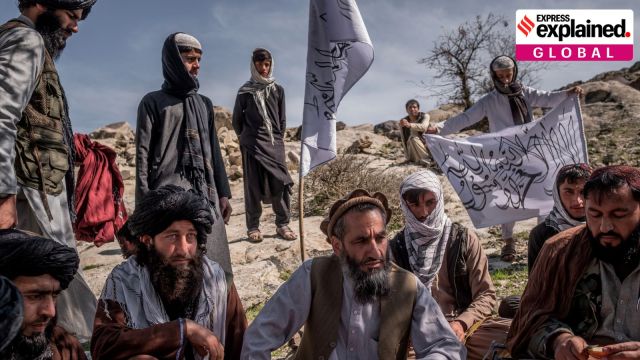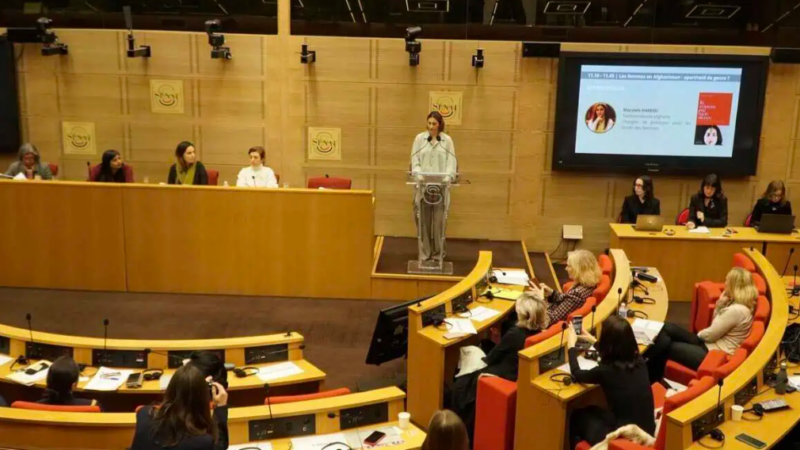Why has Russia formally recognised Afghanistan’s Taliban government?

It remains to be seen if countries like China and Pakistan follow Russia’s lead. Moscow has historically had deep strategic stakes in Afghanistan, and its decision is rooted in the current geopolitical context in Asia and the world.
At a meeting on July 3, Russia’s Ambassador to Kabul Dmitry Zhirnov conveyed to Taliban Acting Foreign Minister Mawlawi Amir Khan Muttaqi that Moscow had decided to formally recognise the Taliban as the legitimate government of Afghanistan.
The Afghan foreign ministry described Russia’s decision as “a historic step that will set a good example for other countries”. It remains to be seen whether China, Pakistan, and other countries follow Russia’s lead.
Days after Moscow’s recognition of the Afghan regime, the International Criminal Court in The Hague, Netherlands, issued arrest warrants against Taliban Supreme Leader Haibatullah Akhundzada and Chief Justice Abdul Hakim Haqqani, saying there were “reasonable grounds” to suspect them of carrying out gender-based persecution.
Pre-revolution Russia had a deep strategic interest in Afghanistan, which led to an intense rivalry with Britain in the 19th century that was famously described by the British intelligence officer Arthur Conolly as the “Great Game”. Afghanistan, which stood as a buffer between Britain’s colonial possessions in South Asia and Russia, was of great strategic importance to both imperialist empires.
As a Great Game imperative, Britain had long tried to control Afghanistan, and had sought to impose itself on the country through the First and Second Anglo-Afghan Wars of 1839-42 and 1878-80 respectively. In 1919, the Emir of Afghanistan, Amanullah Khan, made an attempt to shake off the British, which resulted in the Third Anglo-Afghan War.
The Bolsheviks, who had taken power in Russia after the October Revolution of 1917, were opposed to colonialism and imperialism. They renounced various treaties and agreements of Tsarist Russia, and gave up its colonial possessions, which profoundly impacted anti-colonial movements everywhere.
In 1919, Vladimir Lenin offered the hand of Soviet friendship to Amanullah Khan. He wrote to the Emir that “flourishing Afghanistan is the only independent Muslim state in the world”, and that “the Workers’ and Peasants’ Government [of the Soviet Union] is inclined to grant such assistance on the widest scale to the Afghan nation, and, what is more, to repair the injustice done by the former government of the Russian tsars…by adjusting the Soviet-Afghan frontier so as to add to the territory of Afghanistan at the expense of Russia”.
In the early decades of the Cold War, as Pakistan joined the anti-communist Southeast Asia Treaty Organization (SEATO) and Central Treaty Organization (CENTO), and the US and Britain attempted to run Iran through the puppet Shah, the Soviet stakes in Afghanistan increased greatly. It was crucial for Moscow to have influence in Afghanistan in order to maintain the USSR’s regional security dominance, to prevent instability in Soviet Central Asia, and to assert itself as a global power against the capitalist West.
As part of its ideological project, the Soviet Union propped up communist parties and governments in Eastern Europe and Asia, including the People’s Democratic Party (PDPA) in Afghanistan. In April 1978, the PDPA led the Saur Revolution, a military coup in which the country’s autocratic President Mohammad Daoud Khan was overthrown and killed, and a socialist government aligned with Moscow came to power.
Several months of violence and repression followed as the Pashtun-led Khalqist faction of the PDPA cracked down on the so-called enemies of the revolution. This triggered armed resistance, and as uprisings against the socialist regime started to break out at various places, the Red Army marched into the country in December 1979. The invasion was justified on grounds of the Brezhnev Doctrine, which saw any threat to socialist rule in a Soviet bloc country in East Europe and Central Asia as a threat to them all.
Thus began a decade of Soviet occupation of Afghanistan, and a bruising war in which the Afghan mujahideen were backed financially and logistically by the US-led West, which finally ended with the humiliating withdrawal of Soviet forces from the country.
The Soviet-Afghan war of 1979-89 witnessed the deaths of around 20,000 Soviet soldiers, and more than 1.5 million Afghans.
The Moscow Format Consultations
The recognition of the Taliban by Russia marks a strategic shift in what was once a relationship of animosity and mistrust.
Post-communist Russia under President Vladimir Putin offered support to the US ‘Global war on terror’ in the aftermath of the 9/11 terrorist attacks, which also gave Russia the international legitimacy to pursue its own wars in Chechnya and Dagestan. The first Taliban regime (1996–2001) had recognised Chechnya’s independence, and allowed a Chechen embassy to open in Kabul.
As the government of President Ashraf Ghani steadily lost its grip over the country and war-weariness grew in the US, Moscow sought to re-insert itself into the Afghan picture. The Moscow Format Consultations were initiated in 2017 as a regional platform for discussions on the Afghan reconciliation process among special envoys from Russia, Afghanistan, India, Iran, China, and Pakistan. Russia was concerned that a power vacuum in Afghanistan could make it an exporter of narcotics and terrorism, and a destabilising factor in the region.
On August 15, 2021, as the last American soldiers left Afghanistan amid chaos, the Russian embassy in Taliban-controlled Kabul remained formally open. In September 2022 Russia and the Taliban signed a major preliminary agreement for Russia to supply Afghanistan with discounted petroleum products and wheat. This was the first major foreign economic deal struck by the new rulers of Afghanistan.
During the fifth Moscow Format Consultation in 2023, there was special focus on the activities of the ISIS-K, the Islamic State in Khorasan Province. On March 23, 2024, ISIS-K claimed responsibility for the terrorist attack in Moscow’s Crocus City Hall in which more than 145 people were killed. That July, President Vladimir Putin called the Taliban “allies in the fight against terrorism”.
Later in 2024, representatives of the Afghan government participated in the COP29 summit in Baku, Azerbaijan, the highest-level multilateral engagement by the country since the Taliban takeover.
In April 2025, Russia’s Supreme Court removed the ban on the Taliban as a “terrorist organisation”, which paved the way for Russia to formally recognise the Taliban government in Afghanistan.
The two countries can now conduct bilateral cooperation in trade, security, technology, and energy, even as the Taliban continue with their grave violations of human rights, denying Afghan women the right to study and work, and imposing severe restrictions on their day-to-day living.
In September 2023, China had become the first country to formally name an envoy to Afghanistan, Zhao Xing. Pakistan, the UAE, Turkey, and Azerbaijan have appointed permanent ambassadors in Kabul this year. India has a ‘technical team’ in Afghanistan, which oversees humanitarian assistance, and in November 2024, the Taliban regime appointed Ikramuddin Kamil as “acting consul” in the Afghan mission in Mumbai.
As outlined above, Afghanistan, the so-called “heart of Asia” because of its location, has long been a theatre of geopolitical contestation. This “graveyard of empires” has seen long-running wars and turmoil interspersed with short spells of stability. The decisive victory of the Taliban in 2021 signalled the arrival of relative political stability – some pockets of resistance in the north and activities of terrorist groups like ISIS notwithstanding – and the potential for a resumption of trade and economic activity.
Dhananjay Tripathi, who teaches international relations at South Asian University, put the Russian decision to recognise the Taliban government in a larger geopolitical context that includes the war in Ukraine and its many fallouts.
“In the current geopolitical situation, Russia is facing immense pressure due to the economic isolation from the US and the West. The Ukraine war is draining them, and militarily they are dependent on China. Almost 40% of their ammunition is supplied by China via North Korea. So, it will be a good opportunity for Russia to build economic and military ties with the Taliban in Afghanistan,” Prof Tripathi said. Also, “The power vacuum after the USA left Afghanistan, almost in a rush, had to be filled.
The Afghan economy has been devastated by decades of war, and presents a potential opportunity for a range of Russian exports. The Russian Business Center in Afghanistan estimates that bilateral trade reached $1 billion in 2024, and is set to reach $3 billion by 2025. At the St Petersburg International Economic Forum in June, Russia announced an expansion of its labour market to include Afghan specialists.
In the absence of international recognition, investments have been a challenge for the Taliban regime. In May 2025, Afghanistan agreed to join the China-Pakistan Economic Corridor (CPEC), a project of the Belt and Road initiative of China, but Beijing remains reluctant to invest in Afghanistan. The only known major Chinese investment is the $49 million that Xinjiang Central Asia Petroleum and Gas Co. has spent on developing oil fields near Herat.
What this move by Russia means for India
India has a shared history, cultural bonds and old civilisational ties, and deep economic and strategic stakes in Afghanistan. It also retains significant goodwill among large sections of the Afghan population.
Over the years, India has invested more than $3 billion in projects like the Afghan Parliament, the Salma Dam, and the Zaranj–Delaram highway, which links Afghanistan to Iran’s Chabahar port. India has built hospitals, schools, and offered thousands of scholarships to students. More than 3,000 Afghan students, including 300 girls, are studying in India, according to the Indian government.
“India needs to closely monitor developments in Afghanistan. With Russia diplomatically recognising the Taliban and China establishing close ties, India risks facing implications if it remains passive during this crucial period. Now is the time for India to recalibrate its approach and establish better diplomatic relations with the Taliban. A significant step that could earn India considerable goodwill is the issuance of student and medical visas,” Prof Tripathi said.
A calibrated strategic engagement with the Taliban, driven by pragmatism, is in India’s interest. Afghanistan is crucial for the Connect Central Asia policy that India launched in 2015, and it remains a relevant partner in tackling cross-border terrorism emanating from Pakistan.






